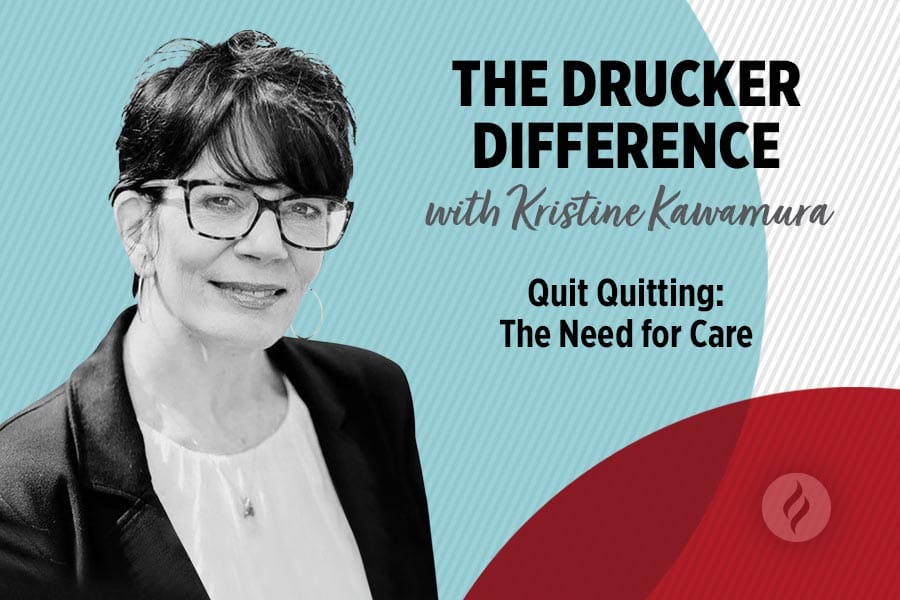The Drucker Difference: Quiet Quitting – The Need for Care

Amidst the many seismic disruptions transforming our world and the world of work, quiet quitting is creating thundering impact for leaders and managers seeking to create competitive advantage in the tech industry. What is quiet quitting? Simply put, leaving work on time! Prioritizing one’s personal life over an overzealous, even addicted, commitment to professional life. Focusing on one’s family at night rather than one’s emails. With the workplace movement of quiet quitting, we are seeing the breakdown of an implicit, emotional contract between the knowledge worker and the tech organization—an entrenched corporate mindset—to overachieve, to sacrifice one’s personal life for professional success in order to obtain a hefty future payout, make money for shareholders, or merely retain their jobs.
This mindset has enabled many tech companies to achieve great competitive advantage, market power, and shareholder value. It has come at a great expense to many employees as they experience heightened levels of stress, anxiety, depression, and burnout. Employees often suffer poor relationships as a result of a toxic relationship with their organization that has led many to ask a pervasive question: Is this all there is?
Quiet quitting suggests that people are realizing that work does not define who they are. People are declaring that they want to be less emotionally involved with their company and more connected with other aspects of their selves. They are more inclined to accept a “living wage” and to avoid advancements that require an unhealthy life-work balance so that they may achieve other aspirations. The old mindset that may have led to competitive advantage is not sustainable. It certainly has not provided sustainable human advantage as leaders realize they must deal with the needs and desires of real human beings who are waking up to the potential fullness of their lives.
Drucker would say the quiet quitting movement must be recognized; that real corporate social responsibility demands businesses take responsibility for growing socio-political discontents and that they become the keeper of society’s conscience and the solver of society’s problems—especially those issues that businesses cocreate. It is the managers responsibility to respond to societal changes and needs, making concern for society central to the conduct of business. Organizations have the responsibility to provide quality of life beyond the quantity of life gained through wage increases that were part of an advancement-obsessed past. Quality of life thus must become the business of business, Drucker said, creating freedom for the individual and producing healthy workplaces and a good society.
As people are choosing to get off the treadmill, how do businesses listen to the underpinnings of quiet quitting and move to create healthier work environments while still creating sustainable competitive advantage?
I believe that the remedy to the virus of quiet quitting is to awaken the intangible management resource of Care in people and organizations. What is Care? Some view Care as the soft, “touchy-feely” quality of the human experience. My research takes the simple, human concept of Care—describes it as a noun and a verb—and operationalizes and institutionalizes it into business through newly transformed “hard” mindsets and behaviors. It is the heart-based feeling that one must act in service, loving-kindness, or highest integrity in order to actualize one’s purpose and values and live the meaning of one’s life. It can be cultivated by leaders with the intention of providing what is needed for the well-being or positive development of a person, organization, and society. It should be cultivated and embedded in company culture to create sustainable competitive advantage. Care is a quality of heart-centered leaders who learn to access heart-based intuitive intelligence, enabling them to integrate their mind, knowledge, and purpose into decision-making. This empowers their capability to balance profitability with purpose, sustainability with bottom line requirements—and choose a new mindset for performance in their companies rather than operating from unhealthy patterns that are entrenched in personal and organizational nervous systems.
What is important to knowledge workers? Motivation theorists say that knowledge workers seek autonomy, mastery, purpose, and relationships in order to best perform. Drucker studied Maslow’s hierarchy of needs, McGregor’s Theory X and Y, and Herzberg’s work on achievement to state that knowledge workers seek responsibility and achievement. However, because managing people is so challenging, he also said that people need strong and healthy leaders to be capable of achievement. People need leaders with both theory X and Y capabilities as they require compassion and human relations along with structure, direction, and security in order to achieve. Leaders, Drucker said, need to continually ask, what is the reality of my situation, and how do I discharge my task of managing workers and working in today’s situation?
The answer is: With Care. It is Care for one’s self that has led to quiet quitting. Care awakened in people will lead to introspective, reflective leaders who do not manipulate others to perform but rather to build respect, integrity, and trust—key components of a high-care workplace. Heart-centered leaders will be able to balance rational and intuitive intelligence in decision-making, listen to the underlying needs and motivations of their people, and learn how to strategically, and compassionately, create healthy workplaces in response to the reality of quiet quitting. Care enlivened in organizations will provide the potential for a new corporate mindset that seeks both sustainable and human competitive advantage.
Kristine Kawamura is a clinical professor of management at the Drucker School of Management. Kawamura is the CEO and founder of Yoomi Consulting Group, Inc., a company with a mission to transform the world by transforming how leaders lead, and people perform.
More from The Drucker Difference: